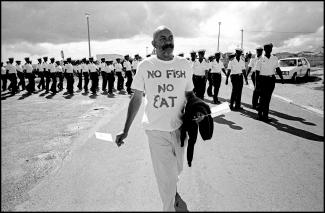
I was born and bred in Langebaan in the area where the restaurants now stand. My birthplace is where holidaymakers now frequent; this is something that bothers me. I belong to an organization called Coastal Links, and another organization called Masifundise. It is these organizations that taught us how to continue to make a living as a fisherman.
The ocean, as well as the lagoon where we live, is very important to us because it is our existence, it is us. But because of the law, it is almost impossible for us to exercise our existence. It is our customary rights, it is our culture, and indeed even our language. A fisherman is one that leaves the house every day so that he can feed his family. In the past, if my father did not go to sea and our neighbor went, he would also provide fish to our household, and vice versa. That is how we lived, even before apartheid. When apartheid came in, all of us were divided.
Other threats [that we face] include the fishing control officers; that is, the fishing police. The fishing territory has also been zoned into three categories—A, B, and C—B being our customary fishing area, this has been allocated to us. C has been allocated to “sport” fishers.
We have now won a court case that increases our area of fishing, but we are still constantly being monitored by the authorities.The court case included taking the respective government department to court, which we won.
Development in the area seems to be booming, holiday resorts are going up; this has an impact on the fish. From what I can see, the sea level is rising. In all my life that I spent in Langebaan, I have never seen a thing as this: some years back there was what I would call a mini tsunami that caused a disaster. It had a huge impact on us, and the minister had to come in to restore the damage so that we can continue fishing.
Climate change is a reality and we have to face it. I attended the World Summit on Sustainable Development, as well as COP 17. We are on COP 23 now, and there are no tangible solutions to climate change as yet. We need to prevent the destructive of the [forces on] our fish; we need to be in control of that. There has to be co-management and mutual respect from everyone who uses the source. Holidaymakers and customary fishers need to respect the ocean.
--Norton Dowries (Langebaan) is chairperson of Coastal Links South Africa and comes from a small-scale fishing family that has been catching fish in the Langebaan Lagoon, Western Cape, South Africa.
